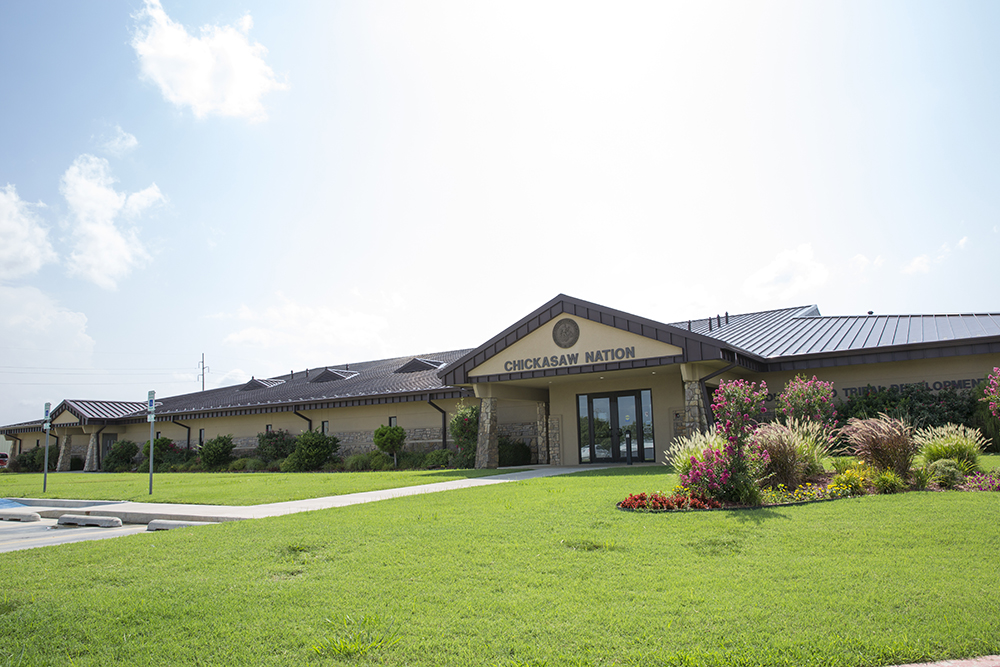
- Details
- By Chickasaw Nation Media
The Chickasaw Nation welcomed visitors from the U.S. Department of Housing and Urban development (HUD) April 17. Chickasaw Nation Governor Bill Anoatubby and tribal officials welcomed HUD representatives for a daylong tour of the Chickasaw Nation’s housing, education and health developments located in Ada, Oklahoma.
“Housing is foundational to the success of Chickasaw families,” Chickasaw Nation Secretary of Community Services Wayne Scribner said. “The Chickasaw Nation’s longstanding relationship with HUD has helped us provide programs and services to support housing needs and community development for our citizens.”
HUD Regional Administrator Candace Valenzuela, and Public and Indian Housing Principal Deputy Assistant Secretary Richard Monocchio were among those to discuss First American housing issues and the Chickasaw Nation’s successful implementation of projects funded through HUD programs.
“We have worked with HUD for over 50 years, building a strong and successful partnership. Their recent visit to Ada allowed us to share the progress we have made for Chickasaw families in the community,” Scribner said.
Locations of interest included stops at the Chickasaw Housing Administration building, Chickasaw Nation Medical Center, Chickasaw Veterans Center and housing provided to veterans in need. Special attention was placed on visiting the Chickasaw Nation’s Hilltop Meadows Addition.
Hilltop Meadows Addition is a planned Chickasaw community which features nearly 60 homes. The community was made possible by collaborations between the Chickasaw Nation, HUD and the City of Ada.
“Hilltop Meadows Addition demonstrates the great relationships we have built,” Secretary Scribner said. “The Chickasaw Nation’s Roads Department completed the roads within the community, while the City of Ada ran water and sewer lines. With 59 new homes, the power and gas companies were happy to provide services as well.”
Other stops along the tour included the Chickasaw Nation’s Wellness Center and several educational facilities.
Chickasaw Nation Housing
For more than half a century the Chickasaw Nation has provided housing to its citizens.
The Chickasaw Nation’s housing authority was created under the Oklahoma Housing Authority Act of 1965. While a great start, it wasn’t until the Indian Housing Act of 1988 that the needs of First Americans were specifically addressed. The legislation was followed by the most significant to date for First Americans, the Native American Housing Assistance and Self-Determination Act (NAHASDA) of 1996.
NAHASDA gave tribes, including the Chickasaw Nation, the ability to assume responsibility and administer housing programs themselves. NAHASDA allowed for flexibility with provided funding, tailoring housing programs to the specific needs of tribal citizens.
Addressing the continually changing housing needs of its Chickasaw citizens, the Chickasaw Nation has developed a number of housing services in addition to home ownership and rental assistance for low-income families. Other services include home ownership counseling and home loan services, home maintenance and repair, as well as home improvement assistance, driveway construction, and storm shelter installation.
More Stories Like This
Native News Weekly (August 25, 2024): D.C. BriefsUS Presidents in Their Own Words Concerning American Indians
Haaland Meets with Southern New Mexico Law Enforcement on Public Safety Priorities
This Day in History – Dec. 26, 1862: 38 Dakota Men Executed by Order of Abraham Lincoln
Merry Christmas 2025
Help us defend tribal sovereignty.
At Native News Online, our mission is rooted in telling the stories that strengthen sovereignty and uplift Indigenous voices — not just at year’s end, but every single day.
Because of your generosity last year, we were able to keep our reporters on the ground in tribal communities, at national gatherings and in the halls of Congress — covering the issues that matter most to Indian Country: sovereignty, culture, education, health and economic opportunity.
That support sustained us through a tough year in 2025. Now, as we look to the year ahead, we need your help right now to ensure warrior journalism remains strong — reporting that defends tribal sovereignty, amplifies Native truth, and holds power accountable.
 The stakes couldn't be higher. Your support keeps Native voices heard, Native stories told and Native sovereignty defended.
The stakes couldn't be higher. Your support keeps Native voices heard, Native stories told and Native sovereignty defended.
Stand with Warrior Journalism today.
Levi Rickert (Potawatomi), Editor & Publisher

